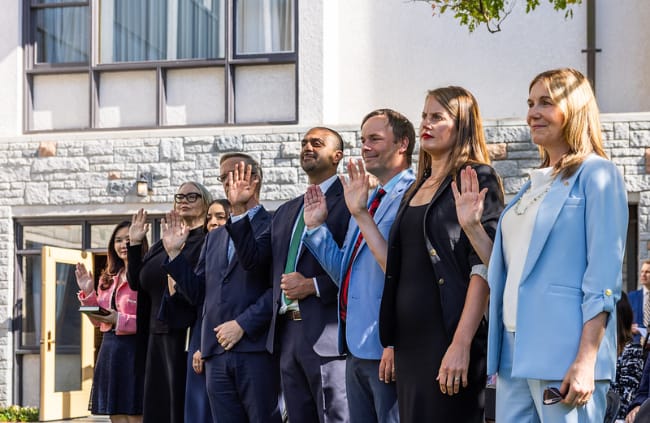- Vancity Lookout
- Posts
- How Vancouver fits in BC’s new cabinet
How Vancouver fits in BC’s new cabinet
Former OneCity councillor Christine Boyle will take over housing. Plus, a new DTES and Chinatown parliamentary secretary

What happened: BC Premier David Eby announced late last week that just nine months into the new term, he was shuffling his cabinet — a move the province described as a “strategic shift to his cabinet in order to centre jobs, the economy and the needs of British Columbians in their communities.”
The new cabinet has some interesting implications for Vancouver, both in terms of Vancouver politicians’ positions in cabinet and a new parliamentary secretary position for the Downtown Eastside and Chinatown.
What’s up with housing? The biggest position to be newly held by a Vancouver politician is certainly the housing portfolio, which is going to Christine Boyle, MLA for Vancouver-Little Mountain. Housing has been one of the areas where the BC government has been willing to — to borrow a phrase — move fast and break things.
Ravi Kahlon’s position as housing minister was characterized by fast, decisive moves, with proponents arguing they were bold solutions to the housing crisis and by opponents as either government overreach or an overreliance on the private sector.
In his time as housing minister, Kahlon gave directives to local governments to meet certain housing completion targets, under the threat of the province appointing an advisor or overriding that municipality’s land-use policy.
Many municipalities have failed to meet those targets, according to Storeys, while other municipalities have built well above their targets. Vancouver, in particular, was at just 31% of its year-one target by the halfway point of its first year, reaching 80% by the end of the year.
What Boyle brings: It’s not clear how Boyle will differ from Kahlon in this role. While Boyle was only first elected to the legislature in the fall, she has a term-and-a-half as a Vancouver city councillor to look to for what her approach may be.
Where she likely won’t depart from Kahlon is the push for densification. Boyle first ran for city council in 2018 under the OneCity banner, where its top platform piece on affordability was to change zoning in low-density neighbourhoods. After her first term, she ran again in 2022, when the party’s top housing policy piece was again about densification, or “ending the apartment ban.”
What about non-market housing? That’s where Boyle may depart from Kahlon. While Kahlon’s time as housing minister has included some direct investment in housing, it has often been far from affordable housing.
In particular, the province spent months talking up its middle-income housing program, only to define “middle” as the 75th percentile of BC incomes. The BC Builds program subsidizes the private market and in one case resulted in studios smaller than 400 square feet renting for $2,650 to $2,750, according to The Globe and Mail.
Boyle, however, could lean harder into publicly built housing. While OneCity’s platforms have generally led with zoning reform, the party has also balanced it with big talk on social housing. Its 2018 platform included a pledge to build 5,000 non-market housing units per year, many of them on public lands, funded through a tax on residential properties valued over $4 million.
The party’s 2022 platform also included significant public housing construction pieces, including turning the Vancouver Affordable Housing Agency from helping non-profits to get permits into a developer in its own right, along with a land value capture tax that could fund the construction of affordable housing.
During her time at council, Boyle pushed for a motion to allow non-profit, co-op and social housing in every neighbourhood in Vancouver, according to Vancouver is Awesome.
Indigenous relations: Boyle is leaving behind the Indigenous relations and reconciliation portfolio, with another Vancouver MLA taking on that role — MLA for Vancouver West-End Spencer Chandra-Herbert, who is leaving behind the tourism, arts, culture and sport ministry.
While it doesn’t point to much in the way of Indigenous-specific issues, the government’s profile of Chandra-Herbert describes him as a “passionate advocate for wild-salmon protection, environmental stewardship, human rights and the rights of renters.”
DTES and Chinatown get a spot: Eby’s latest cabinet sees George Chow getting a demotion from Minister of Citizen Services to parliamentary secretary for the Downtown Eastside and Chinatown. This is a new role in cabinet, but the province’s announcement offers no information about what Chow’s direction will be on this file.
The creation of this file follows some controversy over the province’s handling of the area, after the province hired, then fired, a consultant for the DTES. Michael Bryant, former Legal Aid BC CEO, was handed a $150,000 contract over six months, but the contract was never made public by the province. It only came to light through the media, with few details available, according to The Tyee.
The contract was terminated at around the three-month mark, with the government paying half the $150,000 value of the contract. BC Conservatives Leader John Rustad had criticized the hiring of a consultant for this issue, according to The Tyee, noting the issues in the DTES are clear: housing, mental health and substance use.